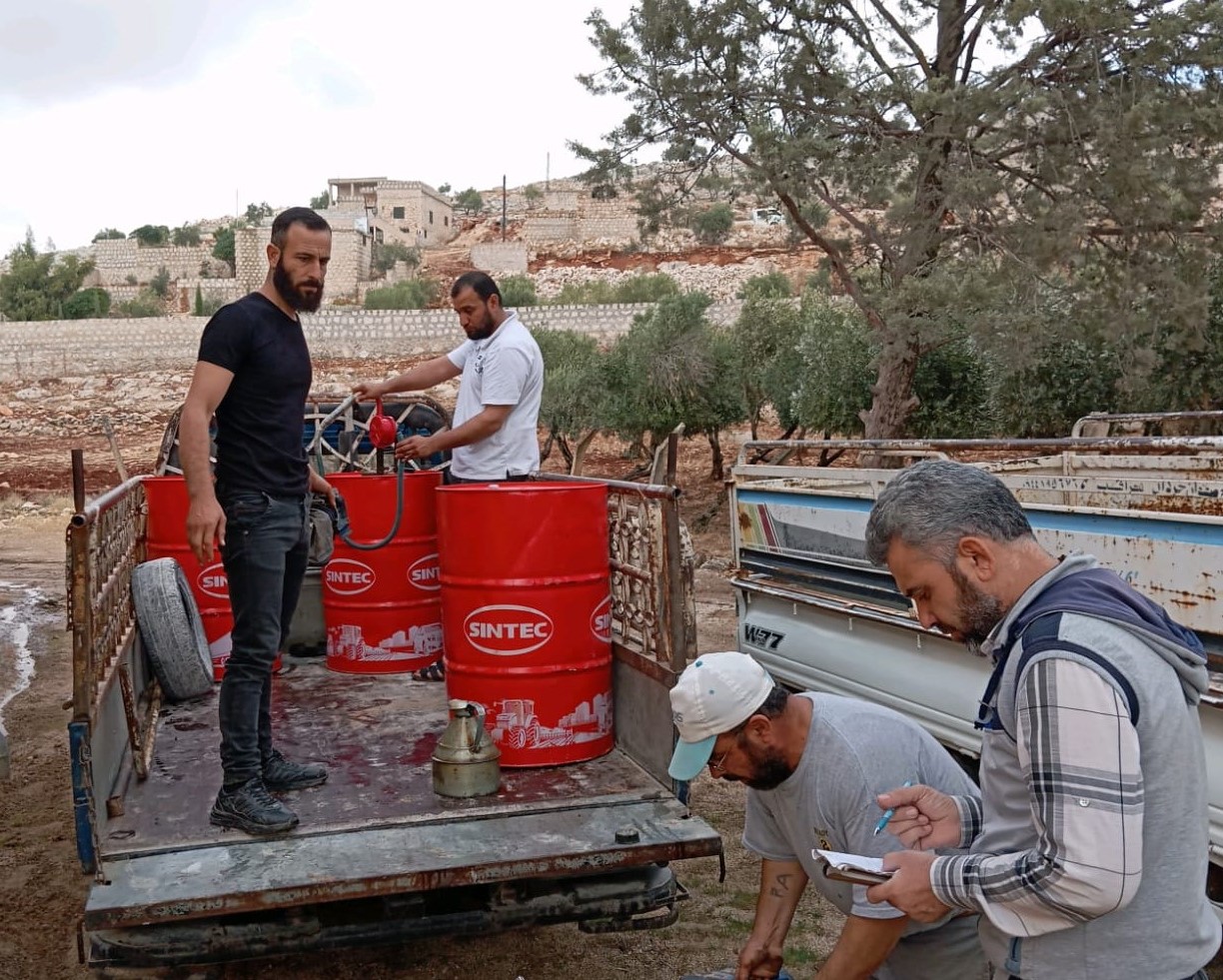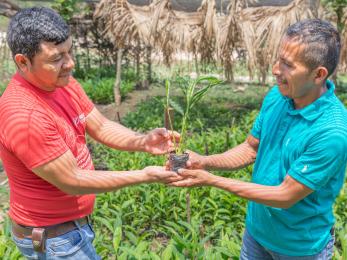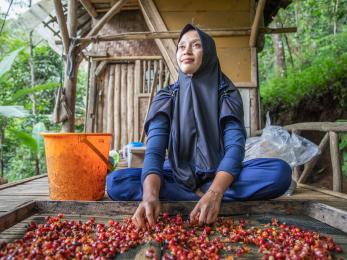“There is no life without water”
Improving water access and sanitation in the Democratic Republic of Congo
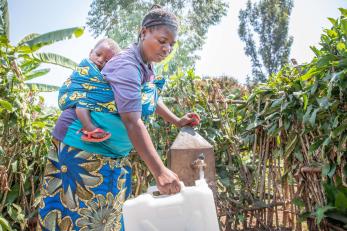
In the Democratic Republic of Congo (DRC) village of Buhengere, near the south of Lake Kivu, Marie-Claire collects water for her family. She turns on a tap to quickly fill a water container, a task that takes her about five minutes, but used to take an hour. Fetching water is no longer a laborious and unsafe chore. Marie-Claire is a farmer and a mother to nine children, and the convenient access to clean water from a tap has changed her life.
In recent years, DRC has experienced devastating crises including natural disasters such as flooding and volcanic eruptions. Less than 150 miles from Buhengere, the escalation of violence around the city of Goma in February 2024 has created chaos and uncertainty in the region, limiting access to clean water. People face health and safety risks from waterborne diseases or from violence as they walk long distances in search of water.
Collecting water used to put people in harm’s way
Before the water tap was installed, the women and girls in Marie-Claire’s village would make an hour-long trek to the nearest river to collect water for drinking, bathing, and cooking. The chore was seen as domestic work to be carried out by women and girls only. It was a physically strenuous trip, especially if the path was muddy, and many people stumbled or fell on their way. Once at the river, they worried about thieves and criminals who would attempt to attack them or steal their clothes. Most of the women in the village can recall a dangerous experience while trying to collect water. The women tried to walk in groups or had to brave the trip alone. In order to avoid the difficulties from collecting water, Marie-Claire spent a great deal of money paying boys to collect water for her family.
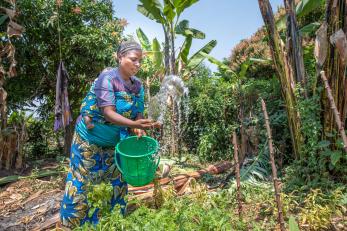
In addition to physical safety concerns, families also contended with waterborne diseases. Diarrhoeal diseases, such as cholera, are one of the top causes of death for children age 5 or younger. In one year alone, Marie-Claire’s children were hospitalised seven times because of illnesses they contracted from the river water. More sustainable, consistent access to clean water makes an outsized impact to everyone’s health and safety, but it is especially important for young children.
Creating access to clean water for an entire region
Since 2014, Mercy Corps has been undertaking one of its largest infrastructure programmes in DRC. The program hopes to provide safe drinking water to almost one million people by rebuilding the water network in the regions surrounding Goma and Bukavu, two cities on the north and south of Lake Kivu, respectively. In September 2022, Mercy Corps completed repairs for a water reservoir that was damaged by a volcanic eruption—restoring clean water access to more than 550,000 people in Goma.
As part of the Food Security Project, Mercy Corps supported communities around Buhengere with 301 water points, creating access to clean drinking water for over 98,000 people. The communities created 40 committees to manage the water points, and 31 of those have systems to maintain facilities and ensure sustainability.
In addition to the three rehabilitated water points in Buhengere, the community created two more water points to reach all of their neighbours like Marie-Claire. Each household contributes a small monthly fee to cover the cost of maintenance and repairs. This fee is a much lower cost than the strain of hospitalisations, and the access to clean water has also increased vegetable yields that provides more income for families, and additional nutrition for their children.
A WASH programme with locally led solutions
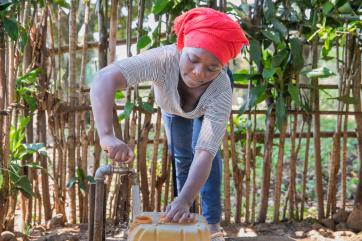
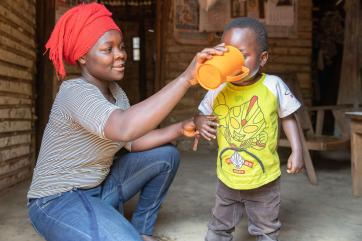
Noella is a young mother in Buhengere who remembers fetching water when she was four years old. The time-consuming chore often made her late for school. When Noella’s sister was hospitalised due to illness from the water, her family could no longer pay for Noella’s school fees.
Mercy Corps provided water, sanitation, and hygiene (WASH) programming and promoted health education in the village, including the new and improved water points. The water taps, hand-washing facilities, and latrines provide clean water, improved sanitation, and waste management to the village. At the end of the regional programme, Mercy Corps helped create or rehabilitate almost 30,000 latrines, more than 21,000 hand-washing facilities, and provided sanitation services to over 160,000 people. As a result, the prevalence of diarrhoea was reduced by 42%. The combination of hygiene education and access to clean water improved the overall health of the community, with fewer children missing school because of illness or hospitalisations.
Since the water points were set up, Noella’s son hasn’t had any major illnesses from drinking unsafe water. And while Noella didn’t finish secondary school, she hopes that her son will be able to complete his education. “There is no life without water,” Noella said.
Strong communities build more resilient futures
In Buhengere, the community’s well-being has increased with improved water security. Children are less likely to contract waterborne diseases since the beginning of the programme. Consistent and more sustainable access to clean water and sanitation services supported over 11,000 farmers in the region to maintain livestock and increase their food security. On nearly 8,600 acres of land, they grew more consistent yields of beans, maize, sweet potatoes, and cassava, providing increased nutrition for their families, and additional food to sell.
The management committees created economic opportunities for those who are skilled in maintaining and protecting the water points. The community meetings discussing the new water points in the village led to a dramatic change in how each household is run. Before the programme, “no husband could fetch water, they could never water plants in the garden, or get vegetables and prepare them for the children,” Marie-Claire said. Now, everyone completes the housework together. The community is safer with the water points and the committees in place, and they can maintain their water security in the future for clean, accessible water for all.

